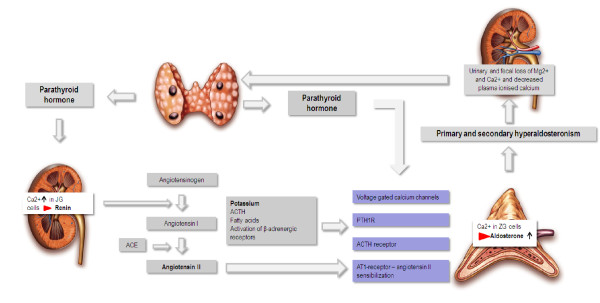Figure 2.
Overview of the bidirectional interplay between aldosterone and PTH. Calcium influx is crucial for activating the synthesis of renin in juxta glomerular cells and aldosterone in zona glomerulosa cells. Renal renin synthesis is mainly controlled by tubular sodium concentration, arterial blood pressure and the sympathetic nervous system. PTH is suggested to stimulate renin synthesis by increasing calcium levels in JG cells. Extracellular potassium, adrenocorticotropic hormone and angiotensin II are major stimulators of aldosterone synthesis in the adrenal glands. Both factors interact with voltage-gated calcium channels and depolarize the zona glomerulosa cells, which results in elevated intracellular calcium levels. PTH might directly stimulate aldosterone synthesis by binding to the PTH1R and adrenocorticotropic hormone receptor. In addition, PTH is suggested to increase sensibilization of angiotensin II, which by itself reduces cellular calcium extrusion through activating Na+/Ca–exchangers in zona glomerulosa cells. Aldosterone in turn facilitates renal and fecal calcium loss resulting in further PTH secretion.

